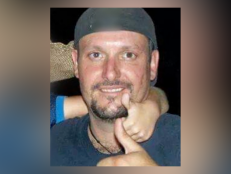Was Former Death Row Inmate Julius Jones Framed For A Murder He Didn’t Commit?
Oklahoma’s governor recently commuted the prisoner’s death sentence to life in prison without parole.

Julius Jones was convicted and sentenced to die for the 1999 shooting death of Edmond businessman Paul Howell. [Oklahoma Department of Corrections via AP File]
A prisoner who has always maintained he’s innocent of committing murder decades ago recently had his execution by lethal injection halted just hours before he was scheduled to die.
On November 18, Oklahoma Governor Kevin Stitt followed the parole board’s recommendation and commuted the death sentence of 41-year-old Julius Jones to life imprisonment without the possibility of parole for the slaying of insurance executive Paul Howell.
“I did not kill Mr. Howell,” Jones, who had exhausted all his appeals, wrote to the parole board last April, according to the BBC. “I did not participate in any way in his murder; and the first time I saw him was on television when his death was reported.”
On July 28, 1999, Howell, 45, was standing by his GMC Suburban in the driveway of his parents’ Edmond home when a gunman fatally shot him in the head in front of his sister, Megan Tobey, and two daughters, ages 7 and 9, and then fled in the vehicle.
Tobey told investigators the shooter was a Black man who was wearing a red bandanna over his face and a stocking cap on his head.
Suspicion fell on Jones, then 19, after a police informant pointed detectives in the direction of him and his high school friend, Chris “Westside” Jordan.
Police interrogated 19-year-old Jordan, and he admitted to the carjacking but blamed Jones for fatally shooting Howell — a move that helped Jordan avoid the death penalty.
Jordan also told detectives about a hiding spot in Jones’ room, where they found a red bandanna as well as the murder weapon, a .25-caliber semi-automatic gun.
In February 2002, a jury convicted Jones and he was sentenced to death.
Advocates for Jones say that his then-legal representatives put up an inadequate defense during trial, including by not questioning Jordan about repeatedly changing his story during police interrogations, failing to produce a single witness on their client’s behalf, including family that insist Jones was home when Howell was killed, and not showing jurors photographic proof that at the time of the murder Jones had a very short fade haircut.
“The person that Ms. Tobey described as being the shooter did not match the description of how Julius looked at the time,” Jones’ attorney, Dale Baich, who did not represent him at trial, said in 2019, according to KJRH-TV.
The description, however, matched Jones’ co-defendant, Baich claimed. The lawyer also noted two witnesses never called to testify at trial “said that Chris Jordan said to them that he set Julius up for this crime.”
The district attorney who prosecuted the case, “Cowboy” Bob Macy, reportedly was later involved in a scandal involving faked evidence and a subsequent review of his 54 death-penalty cases over 21 years found prosecutorial misconduct in around one-third.
While Oklahoma-based attorney Kelly Masters, who recently served as an advisor for Jones’ defense, was “convinced we were about to execute an innocent man,” others, including the victim’s loved ones, take an opposite stance.
“Our family continues to be victimized by Julius Jones and his lies,” the murdered man’s brother, Brian Howell said in September, The New York Times reported.
After Jones’ sentence was commuted, Oklahoma Attorney General John O’Connor said in a statement: “We are greatly disappointed that after 22 years, four appeals, including the review of 13 appellate judges, the work of the investigators, prosecutors, jurors and the trial judge have been set aside. A thorough review of the evidence confirms Julius Jones’s guilt in this case and that the death penalty was warranted.”
![Selena receives a Grammy Award at The 36th Annual Grammy Awards in March 1994 [via Getty Images]](http://investigationdiscovery.sndimg.com/content/dam/images/investigationdiscovery/crimefeed/legacy/2021/03/getty-selena-quintanilla-perez-1309300538.png.rend.hgtvcom.231.174.suffix/1617128091576.png)








